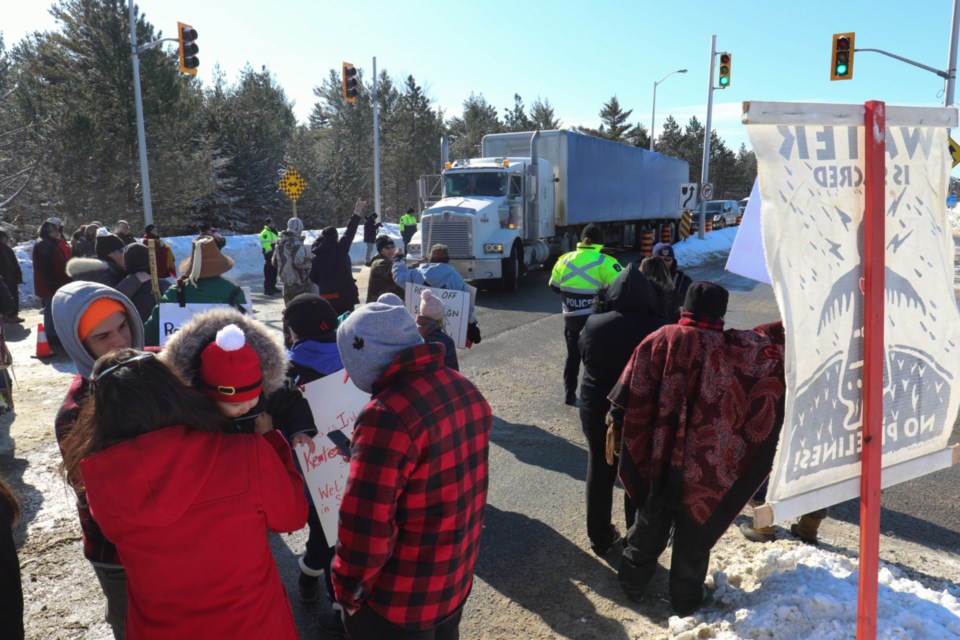Dozens of people took part in a solidarity rally for Wet’suwet’en at the intersection of Highway 17A and 17B Thursday, hoisting signs supporting hereditary chiefs who oppose the construction of Coastal GasLink’s $6-million, 670-kilometre liquified natural gas pipeline in northern British Columbia.
While hereditary chiefs oppose the construction of the pipeline that runs through their unceded, traditional Wet’suwet’en territory, a few people standing in solidarity during Thursday’s demonstration in Sault Ste. Marie say the pipeline could have a negative impact on the environment.
“We are the land. If we destroy the land, we kill the air, the water, everything - there’ll be no humans left,” said Sue Chiblow, who co-organized the solidarity rally with fellow Garden River First Nation member Amanda Cress. “We all need water to drink, we all need air to breathe.”
“It’s not just for Indigenous people, though. It’s for everybody. It’s the well-being of the earth and the land and the water. Everybody needs the same things that Indigenous people need to survive,” added Cress while speaking to SooToday. “So we’re fighting for that.”
A ceremony opened Thursday’s demonstration, which temporarily halted eastbound traffic on Trunk Road, causing a lineup of vehicles.
Some people were less patient than others when it came to the interruption.
One man bypassed the lineup with his pickup truck, using the westbound lane on Trunk Road to try and get through the intersection before being stopped by police.
“They’re infringing on my rights,” the man was overheard by SooToday saying to police. “This is horseshit."
The man, who did not wish to be identified, told SooToday that his pregnant partner in Echo Bay was cramping up, and that he was rushing to get to her.
“I have to go get her. They’re infringing [upon] my rights over this,” he said. “I don’t know. I don’t know what else to tell you. That’s what they’re doing.”
Another man, leaning out of a passenger window of a passing pickup truck, unleashed an angry, f-bomb-laden tirade at demonstrators while extending his middle finger to them.
Hereditary chiefs, clans unanimously oppose pipeline, while First Nations under Indian Act ink benefit agreements
The Unist’ot’en Camp, established by Wet’suwet’en hereditary chiefs in 2010 to block construction of the Coastal GasLink pipeline, says the company, along with federal and provincial governments and the RCMP, are “openly violating Wet’suwet’en, Canadian, and international law” by going ahead with construction of the pipeline, which would run from the Dawson Creek area to an area near Kitimat.
“Each clan within the Wet’suwet’en Nation has full jurisdiction under their law to control access to their territory,” reads a statement on the Unist’ot’en Camp website. “Under ‘Anuc niwh’it’en (Wet’suwet’en law) all five clans of the Wet’suwet’en have unanimously opposed all pipeline proposals and have not provided free, prior, and informed consent to Coastal Gaslink/TransCanada to do work on Wet’suwet’en lands.”
In September 2018, Coastal GasLink signed benefit agreements with 20 elected First Nation band councils along the pipeline route.
But hereditary chiefs contend that the pipeline project still requires their authorization, regardless of the First Nations under the Indian Act that signed benefit agreements with Coastal GasLink.
Solidarity actions, blockades follow police raids
In early February, heavily-armed RCMP officers, enforcing an injunction on behalf of Coastal GasLink, arrested 28 supporters of the Wet’suwet’en hereditary chiefs for blocking access to a pipeline work site.
A series of protests - including ongoing blockades of rail lines - began happening across Canada after the enforcement of the injunction, inspiring the hashtag #ShutDownCanada.
Both CN and VIA Rail have announced more than 1,400 layoffs between them in the midst of ongoing rail blockades, prompting heated debate on social media on whether or not the layoffs are directly related to the blockades across the country.
What's happening now
Prime Minister Justin Trudeau and his cabinet have so far rejected demands from conservatives in Ottawa and provincial legislatures to end the blockades.
On Thursday, Public Safety Minister Bill Blair told reporters that British Columbia RCMP has satisfied the conditions of hereditary chiefs by moving officers away from the area where traditional leaders have been opposing the pipeline.
Hereditary chiefs have demanded that RCMP leave their traditional land, and have refused to speak with federal and provincial governments until that condition is satisfied.
During a speech in the House of Commons, Crown-Indigenous Relations Minister Carolyn Bennett said that she’s looking to meet with hereditary chiefs soon.
"We are committed to finding a mutually acceptable process with them and the Wet'suwet'en nation, to sit down and address the urgent and long-term issues at hand," Bennett said. "We hope that the Wet'suwet'en will be able to express to those in solidarity with them that it is now time for them to stand down and let us get back to work."
As vehicles moved slowly through Thursday’s demonstration, Rose Sayers of Garden River First Nation told SooToday that she showed up to the Wet’suwet’en solidarity rally out of concern for the way RCMP carried out its raids on Wet'suwet'en supporters in early February.
“I’m just concerned about the way things are happening for the environment, and for the people in Wet’suwet’en,” she said. “I have children of my own, and we are here to ensure that our earth is clean and healthy for them when they grow up.”
“It’s really sad to see that the RCMP is going into their territory and scaring and traumatizing our people. They’re there with loving hearts, and these people are showing up fully armed.”
– with files from The Canadian Press
Editor's note: Comments on the above article have been disabled after repeated inappropriate posts. Please read our Terms of Service before commenting in any comment section of SooToday.com.
